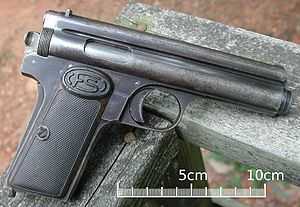Frommer Stop
| Frommer Stop | |
|---|---|
 Frommer Stop in caliber 7.65mm Browning | |
| Type | Pistol |
| Place of origin |
|
| Service history | |
| Used by | Royal Hungarian Army |
| Wars |
World War I World War II |
| Production history | |
| Designed | 1912 |
| Variants |
Pisztoly 12M Pisztoly 19M Pisztoly 39M |
| Specifications | |
| Weight | 610 g (22 oz) |
| Length | 165 mm (6.5 in) |
| Barrel length | 95 millimeters (3.7 in) |
|
| |
| Cartridge |
7.65mm/.32 ACP 9mm Kurz/.380 ACP |
| Action | Recoil-operated |
| Rate of fire | Semi-automatic |
| Muzzle velocity | 280 m/s (919 ft/s) |
| Feed system | 7 rounds (detachable box magazine) |
The Frommer Stop is a Hungarian long-recoil pistol manufactured by Fémáru-, Fegyver és Gépgyár (FÉG) [Metalware, Weapons and Machine Factory] in Budapest. It was designed by Rudolf Frommer, and its original design was adopted as the Pisztoly 12M in 1912, created for the Royal Hungarian Army. The handgun was manufactured in various forms from 1912-1945 and used in the Hungarian Armed Forces. The Stop is 165 millimeters (6.5 in) long with a 95 millimeters (3.7 in) 4-groove rifled barrel. Unloaded weight is 610 g (22 oz), and the detachable box magazine holds 7 rounds.
The predecessor to the Stop pistol, the M1910, was chambered in a proprietary 7.65mm (.32 ACP) cartridge having a crimp in the casing at the base of the bullet. This round achieved a velocity of 920 feet per second (280 m/s) from the gun. Frommer redesigned the pistol with a more conventional layout. Patented in 1912, this variant was produced from 1919 to 1939, under the name Pisztoly 19M. It was adopted as the official sidearm of the Hungarian Armed Forces. The last variant of the Stop, the Pisztoly 39M, was produced in 9mm Kurz (.380 ACP); however it was never adopted as a service pistol.
Use as a double barrel machine gun
The Frommer M.17 pistol was also used in a dual-mounted tripod that fired both pistols in full automatic. The pistols were inserted upside-down and fed from 25 round box magazines.
References
- "Frommer Baby and Stop Pistols"
- (1910) Le Pistolet Automatique Frommer, Calibre 7,65 mm (French language manual/brochure for the M1910)
- Frommer double barrel machine gun
- Frommer M.17 palm fired pistol